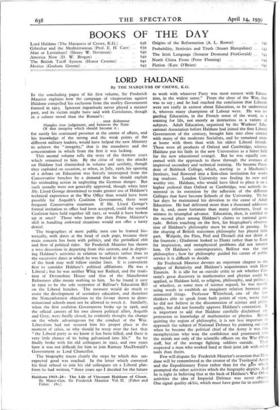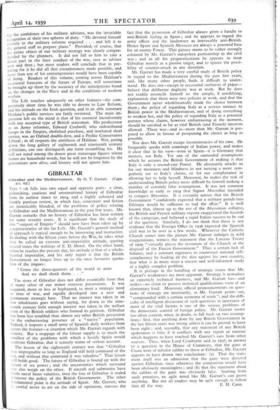BOOKS OF THE DAY
Lord Haldane (The Marquess of Crewe, K.G.) Gibraltar and the Mediterranean (Prof. E. H. Carr) . Man or Leviathan? (Henry W. Nevinson) America Now (D. W. Brogan) . . . The British Tariff System (Honor Croome) Mexico (Graham Greene) ...
638
639 640 640 641 642 Origins of the Reformation (A. L. Rowse) ...
Probability, Statistics and Truth (Stuart Hampshire) ... The Irish Language (Senator Desmond FitzGerald) North China Front (Peter Fleming) Fiction (Kate O'Brien) 642
643
643 644 645
LORD HALDANE
By THE MARQUESS OF CREWE, K.G.
IN the concluding pages of his first volume, Sir Frederick Maurice explains how the campaign of vituperation against Haldane compelled his exclusion from the motley Government formed in 1915. Ignorant ingratitude never played a meaner part, and its victim might have said with Coriolanus, though in a calmer mood than the Roman's : . . . your dishonour Mangles true judgement, and bereaves the State Of that integrity which should become it ; for surely his continued presence at the centre of affairs, and his knowledge of the strong and the weak points of the different military leaders, would have helped the new Ministry to achieve the " integrity," that is the soundness and the concentration in which from the first it was lacking.
This second volume tells the story of the thirteen years which remained to him. By the close of 1915 the attacks on Haldane had diminished in volume and acerbity, though they exploded on occasion, as when, in July, 1916, his opening of a debate on Education was fiercely interrupted from the Conservative benches by a demand that he should explain his misleading action in neglecting the German danger. But such assaults were not generally approved, though when later Mr. Lloyd George determined to make greater use of Haldane's technical experience at the War Office than would have been possible for Asquith's Coalition Government, there were frequent Conservative murmurs. If Mr. Lloyd George's formal invitation to office had been accepted, could the second Coalition have held together till 1921, or would it have broken up at once? Those who know the then Prime Minister's skill in handling awkward situations would not offer a hasty denial.
The biographies of most public men can be framed his- torically, with dates at the head of each page, because their main concern has been with politics, and the periodical ebb and flow of political tides. Sir Frederick Maurice has shown a wise discretion in departing from this custom, and in depict- ing Haldane's activities in relation to subjects rather than to the successive dates at which he was busied in them. A survey of the book may well follow similar lines. It is convenient first to consider Haldane's political affiliations. He was a Liberal ; but he was neither Whig nor Radical, and the tradi- tion of Devonshire House and that of the Manchester Reformers alike meant nothing to him. So he found it easy in 1902 to be the sole supporter of Balfour's Education Bill on the Liberal benches. The measure would do much to assist the development of secondary education, and therefore the Nonconformist objections to the favour shown to deno- minational schools must not be allowed to wreck it. Similarly, when the first coalition Government broke up in 1916, and the official careers of his two closest political allies, Asquith and Grey, were finally closed, he evidently thought the change on the whole advantageous for the conduct of the War. Liberalism had not secured him his proper place at the moment of crisis, so why should he weep over the fact that " the Liberal party as we know it has been killed, and there is very little chance of its being galvanised into life." So he finally broke with his old colleagues in 1922, and two years later it was not difficult for him to join Ramsay MacDonald's Government as Lord Chancellor.
The biography traces clearly the steps by which this un- expected good was reached. In the letter which conveyed his final refusal to join his old colleagues on a Liberal plat- form he had written, " three years ago I decided for the future Haldane 1915-28: The Life of Viscount Haldane of Cloan. By Major-Gen. Sir Frederick Maurice. Vol. II. (Faber and Faber. r8s.) to work with whatever Party was most earnest with Educa.• don, in the widest sense." From the close of the War, that was to say ; and he had reached the conclusion that Liberals were not really in earnest about Education, as he understood it, whereas many champions of Labour were. He was re- garding Education, in the French sense of the word, as a training for life, not merely as instruction in a variety of subjects. Adult Education, organised by the Workers' Edu- cational Association before Haldane had joined the first Liberal Government of the century, brought him into close contact with many of the moderate Socialists, and he remained more at home with them than with his oldest Liberal friends. These were all products of Oxford and Cambridge, whereas Haldane put his faith in the new Universities as a fairer field for the new educational evangel. But he was equally con- cerned with the approach to these through the avenues of improved secondary and technical training. He became Presi- dent of Birkbeck College, which, starting as a Mechanic's _Institute, had flowered into a first-class institution for work- ing students. London University was finding its new and worthy site. Haldane, who would have liked to place it on a higher pedestal than Oxford or Cambridge, was actively in- terested in its extension by the adhesion of the different Colleges that have become Schools of the University. To his last days he maintained his devotion to the cause of Adult Education. He had delivered more than a thousand addresses for it, and, more fortunate than many reformers, lived to witness its triumphal advance. Education, then, is entitled to the second place among Haldane's claims to national grati- tude. Before touching on the first, his biographer's observa- tion of Haldane's philosophy must be noted in passing. In the shaping of British statesmen philosophy has played little part. Walpole, the Pitts, Peel and Disraeli did not drink at the fountain ; Gladstone looked to Dante rather than to Kant for inspiration, and metaphysical problems did not interest him. Of Haldane's contemporaries, Balfour was the one philosopher ; how far philosophy guided his career of public service it is difficult to decide.
Sir Frederick Maurice devotes an important chapter to the subject of Relativity and Haldane's acquaintance with Herr Einstein. It is idle for an outside critic to ask whether Ein- stein's great discovery in mathematics and physics could be applied, as Haldane held, to religion, philosophy, and politics ; or whether, as some men of science argued, he was merely using words to establish an imaginary relation between un- connected things. Professor Whitehead, one of the few thinkers able to speak from both points of view, wrote that he did not believe in the disconnexion of science and philo- sophy, but did not formally approve Haldane's contention. It is important to add that Haldane carefully disclaimed any pretension to knowledge of mathematics or physics. Before quitting the region of philosophy, it is not less important to approach the subject of National Defence by pointing out that when he became the political chief of the Army it was this metaphysician who won the confidence and penetrated into the minds not only of the scientific officers on the War Office staff, but of the average fighting soldiers outside. They respected a man who worked hard at their joint job with other tools than theirs.
Few will dispute Sir Frederick Maurice's assertion that Hal- dane will be remembered as the creator of the Territorial Army and the Expeditionary Force rather than for the gIts which prompted the other activities which the biography depicts. Arid he is right in believing that at the back of Haldane's War Office activities the idea of Imperial Defence was never absent. One signal quality o&his, which must have gone far in establish- ing the confidence of his military advisers, was the invariable recognition of their two spheres of duty. " He devoted himself entirely to the military reforms required . . . and left it to the general staff to prepare plans." Provided, of course, that the prime object of our military strategy was clearly compre- hended by the planners. It did not fall to him to take a direct part in the later conduct of the war, save as adviser now and then ; but most readers will conclude that in pre- paring for it he did all that circumstances made possible, and more than any of his contemporaries would have been capable of doing. Readers of this volume, coming across Haldane's occasional forecasts of the future of Europe, will sometimes be brought up short by the accuracy of the anticipations based on the changes in the Navy and in the conditions of modern warfare.
The Life touches adequately on other features—the com- paratively short time he was able to devote to Law Reform, and his attitude on the Irish question, and in an able summary Haldane's public services are fairly reviewed. The main im- pression left on the mind is that of his essential inconformity with any accepted type of British statesman. His predecessor as an Army reformer, Edward Cardwell, who redistributed troops in the Empire, abolished purchase, and instituted short service, was an Oxford double-first, and a Peelite Conservative Liberal ; in all respects the antithesis of Haldane. Nor, gazing down the long gallery of eighteenth and nineteenth century politicians, can one distinguish any form resembling his. He will not stand among the dozen great statuesque figures whose names are household words, but he will not be forgotten by the generations now alive, and history will not ignore him.







































 Previous page
Previous page